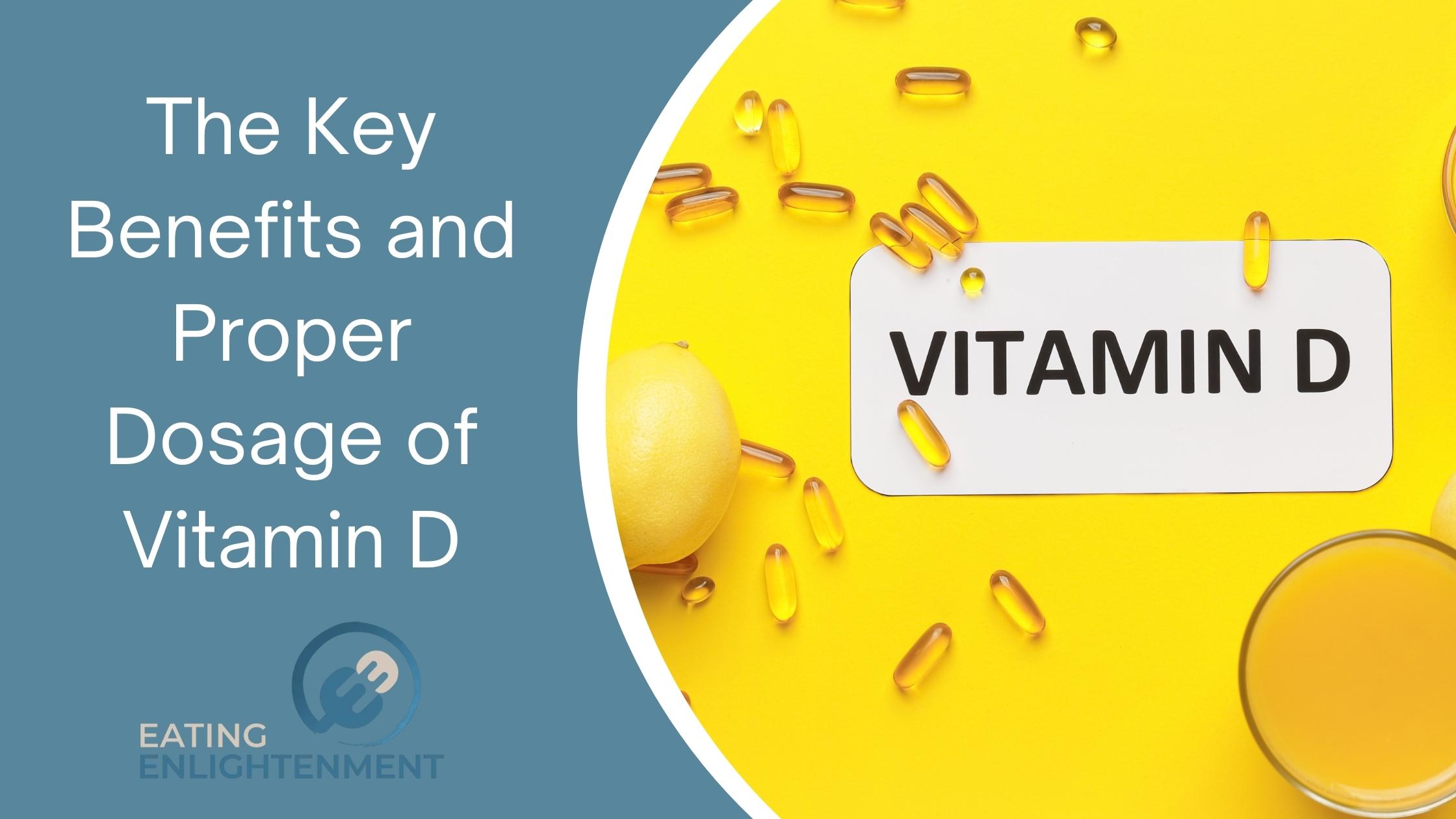Vitamin D is one of the most essential vitamins required for overall wellness and health. Although it’s vital for the human body, most people are still unaware of its importance, and many individuals have Vitamin D deficiency without even realizing it. This is why you should know the proper Vitamin D dosage and why it is necessary.
In this blog, we’ll review all the critical benefits of Vitamin D and the appropriate dosage to help you make better-informed choices for your health.
The Key Benefits of Vitamin D:
Vitamin D is fundamental in maintaining strong and healthy bones by helping the body absorb calcium. It also has a vital function in regulating phosphorus levels in the body. Besides, there are several other crucial benefits of Vitamin D, such as:
Boosts Immune System: Vitamin D is essential in improving and strengthening the immune system. It helps the body fight off infections, viruses, and bacteria by reducing inflammation and improving immune cell function. It would help if you took a perfect vitamin D dosage.
Prevents Chronic Diseases: Vitamin D is associated with a lower risk of chronic diseases, such as heart disease, type 2 diabetes, and multiple sclerosis. It also helps in reducing the risk of colorectal, breast, and prostate cancers.
Enhances Mental Health: Several studies suggest that Vitamin D plays a vital role in regulating mood and mental health and preventing depression.
Some people are overdoing it in search of better health.
- Seeking better health is a journey we can embark on with the proper steps.
- Vitamin D is essential to our body’s overall wellness, but it can be tricky to get the balance right, and too much may lead to harm.
- The recommended daily dose for most adults is between 600-800 IU.
- Age, skin type, location, and overall health can influence Vitamin D needs.
- It’s best to talk with a healthcare provider before taking any supplements.
- Health journeys should be undertaken steadily and mindfully, making choices that nourish the whole self.
- Empowerment comes from knowing you have the power to shape your health journey.
Food Sources
There are three primary ways to get Vitamin D: food, supplements, and sunlight. Foods like fatty fish, fortified dairy products, and Vitamin D supplements can help boost your intake. As we’ve discussed, sensible sun exposure can also help our bodies produce Vitamin D.
Here are some additional ideas for getting your vitamin D needs met through food:
1. Fatty Fish: Have you tried salmon, mackerel, or trout? These fish are delicious and rich in Vitamin D. It’s like nature’s saying, “Here, have some sunshine!”
2. Egg Yolks: Did you know the humble egg yolk is a good source of Vitamin D? It’s incredible how something so small can be so nutritious.
3. Fortified Foods: Have you noticed the term ‘fortified’ on food ‘labels? Foods like milk, orange juice, and cereals often have Vitamin D added to them. It’s like an extra health boost with every bite or sip!
What dose of vitamin D supplements do I need?
Most adults’ recommended daily vitamin D supplement is 600 to 800 International Units (IU). However, some sources suggest that adults can take 1,500 to 2,000 IU daily. It’s essential to consult with a healthcare provider to determine the proper dosage for your specific needs.
However, research shows that many individuals require higher doses of Vitamin D, which can vary depending on age, health status, and lifestyle.
The recommended daily dosage for individuals with Vitamin D deficiency is 1000-4000 IU.
It is advisable to consult with a healthcare provider to determine the appropriate dosage for you.
Safety and side effects
While Vitamin D plays a crucial role in our body, it’s essential to take it mindfully. Consuming too much can lead to Vitamin D toxicity, which manifests as nausea, vomiting, weakness, and frequent urination. Severe cases may result in bone pain and kidney problems.
Remember, every individual is unique, and so are their Vitamin D needs. It’s always best to consult a healthcare provider before starting any supplement regimen.
Sun exposure
- When exposed to sunlight, our bodies can produce Vitamin D – often called the “sunshine vitamin”n.”
- To get enough “Vitamin D, expose about 25% of your body (e.g., hands, face, neck, and arms) to the sun for 8-10 minutes during midday when it is at its highest.
- Too much sun exposure can increase the risk of skin cancer, so balance sun exposure with protection measures such as sunscreen and protective clothing.
- 10-15 minutes of sun on arms and legs a few times a week can generate almost all necessary Vitamin D.
- Skin absorbs sunlight differently depending on location, skin type, and time of year; it’s best to contact a healthcare provider for advice.
Factors that might affect your vitamin D levels
Here are a few key factors:
- Sunlight Exposure: However, living in higher latitudes, having darker skin, or spending less time outdoors can limit your body’s ability to produce sufficient Vitamin D.
- Diet: Foods rich in Vitamin D, like fatty fish and fortified foods, can help increase your levels.
- Age: Did you know that your skin’s ability to skin’s Vitamin D decreases as you age? This means older adults may need to pay extra attention to their Vitamin D intake.
- Weight: Individuals with a higher body mass index (BMI) often have lower Vitamin D levels.
- Absorption Issues: Certain health conditions, such as celiac disease or Crohn’s disease, can affect your body’s ability to absorb vitamin D from food.
- Use of Sunscreen: While protecting your skin from harmful UV rays is essential, did you know that sunscreen can also reduce your skin’s production of vitamin D?
Health Risks from Excessive Vitamin D
While Vitamin D is essential for our health, excessive intake can lead to adverse effects. Some of these include nausea, vomiting, weakness, and severe complications like kidney damage.
Vitamin D supplements and muscle function
Vitamin D supplements can play a crucial role in promoting bone health, especially in minority populations like African Americans and Latinos, who often have high levels of vitamin D insufficiency.
However, research suggests that the specific needs may vary among different ethnic groups, with some studies indicating that African Americans might not require as much Vitamin D for optimal bone health as other groups. Additionally, while higher serum 25OHD levels are associated with increased bone mineral density, the impact of Vitamin D supplementation on preventing fractures is still under debate.
Always consult a healthcare provider to determine the best approach for individual needs.
Conclusion:
Vitamin D is an essential nutrient the human body requires for various critical functions. Apart from maintaining bone health, it is crucial in boosting the immune system, preventing chronic diseases, and improving mental health.
The recommended Vitamin D dosage for adults ranges from 600-800 IU daily, but higher doses may be necessary for individuals with Vitamin D deficiency.
Therefore, regular consultation with a healthcare provider is vital for maintaining adequate Vitamin D levels and optimizing overall health and wellness. So, go ahead and get your daily dose of Vitamin D today!








